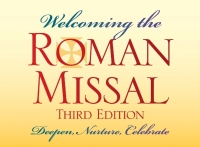a stumbling block for the Revised Roman Missal
 I was at a gathering of ministry leaders the other day and I found out why some people had such a huge resistance to the new Roman Missal English translation. The sad thing is, it is all based on a huge misunderstanding, which means there is an opportunity for solid catechesis.
I was at a gathering of ministry leaders the other day and I found out why some people had such a huge resistance to the new Roman Missal English translation. The sad thing is, it is all based on a huge misunderstanding, which means there is an opportunity for solid catechesis.
First thing's first, the people who were angriest were the oldest. They represented the mid-60's and older crowd. Not a single young adult or middle-aged person was upset about this third revision. As I noticed this, I began asking some questions to them as to why they were angry.
That's when I discovered the huge misunderstanding.
They think that when people say, "We're getting back to the Latin text better" or "It's much more faithful to the Latin Missal", that we are saying, "Oh thank God we are just a step away from implementing the Tridentine Latin Mass again everywhere!"
They do not have an understanding of the so-called Novus Ordo missal and its relationship to the Tridentine missal. They think that "the Latin" means "the mass of their youth" which they, in no uncertain terms, hated a lot (I'm sure their hatred for the Latin Mass had nothing to do with the fact that they were 8 years old in 1963). They were upset because they thought Pope Benedict was making the English-speaking world turn back to the Tridentine form of the Mass, with its funny words and interesting phrases.
They just had no clue that the official language of the Latin/Roman Church is indeed still Latin and that everything officially promulgated by the Roman Catholic Church is through the original Latin text. They did not know that the liturgy of the Roman Missal is written entirely and authoritatively in Latin, and thus needs to be translated painstakingly into a multitude of languages, English included. They did not have the slightest knowledge of liturgical history and/or development.
All they knew was they grew up with the Latin, they hated, and they hate this new translation because it is "going back to the Latin".
So the opportunity for us in catechetical endeavors is to explain some liturgical history, talk about the Christian East and West, go into details about the Gregorian liturgy and especially chant, explaining the why and how of the Council of Trent's liturgical reforms and standardizations, and then finally dive into the Second Vatican Council, the modern liturgical documents, and the Novus Ordo liturgical changes. There is a lot of catechesis that can be done that will open the minds and hearts of our congregations, exposing them to the beautiful richness of our Catholic heritage and Tradition.
Who knows, maybe it will inspired some old folks to reexamine the Extraordinary Form of Mass (A.K.A., the Tridentine Mass in the 1962 Roman Missal)!
